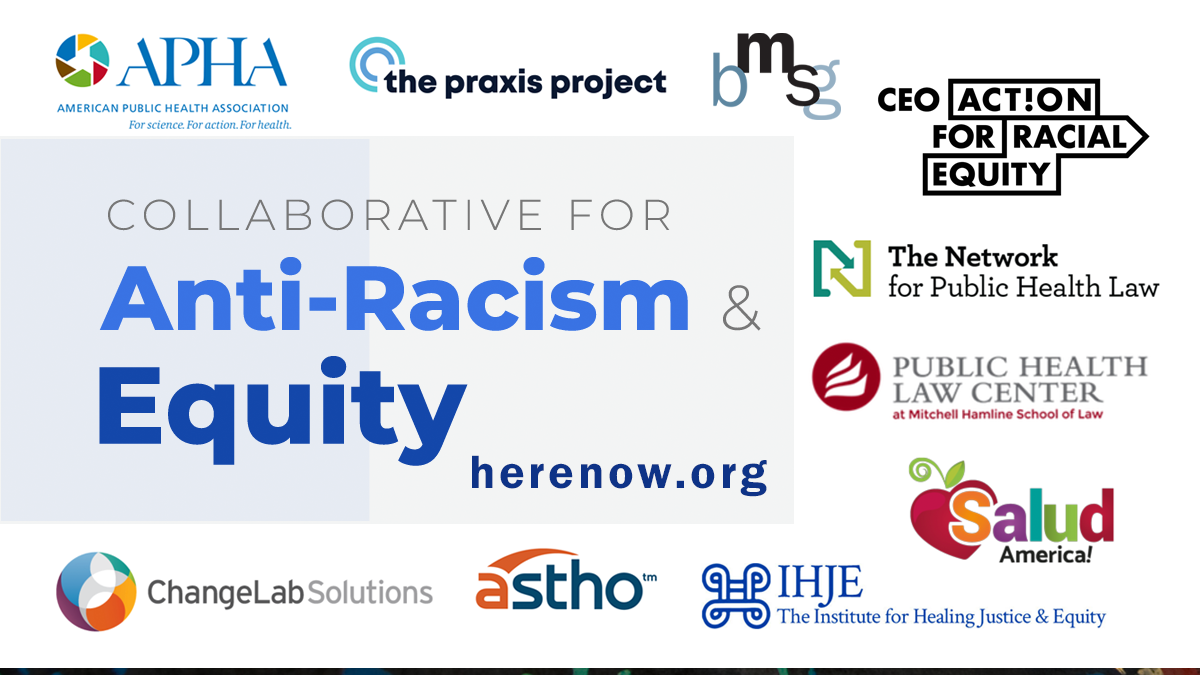
Share On Social!
In late 2020, public health and racial justice advocates started meeting monthly to understand and support the movement to declare racism a public health crisis.
They shared resources, hosted webinars, and led workshops to spur action against racism.
Now, these advocates have formally become the Collaborative for Anti-Racism and Equity (CARE), a group of partner organizations including Salud America! at UT Health San Antonio
CARE has launched a website to streamline access to tools and information, help people make connections, and inform solutions to advance health and racial equity.
“The website is a place where those working in health equity, racial equity, and anti-racism can get access to some important resources to inform their work, if they are just getting started in this area or are far along in their process for positive change,” said Dr. Amelie G. Ramirez, director of the Salud America! program and the Institute for Health Promotion Research at UT Health San Antonio, which is a partner in the new CARE Collaborative.
What Is the Collaborative for Anti-Racism and Equity (CARE)?
CARE was formed by the Network for Public Health Law and a group of foundational organizations, including Salud America!, American Public Health Association (APHA), ChangeLab Solutions, The Institute for Healing Justice and Equity at Saint Louis University, and the Public Health Law Center.
Advocates from these groups first gathered in December 2020 to analyze and support the effort to declare racism a public health crisis.
At that time, about 200 cities, counties, and leaders had declared racism a public health crisis.
Since then, several new partners have joined. These include the Association of State and Territorial Health Officials, Praxis Project, CEO Action for Racial Equity, and Berkeley Media Studies Group.
As part of CARE, partners share their work in this space and explore opportunities for support and collaboration.
 For example, APHA developed an interactive map of localities that adopted a declaration on racism as a public health crisis and created a webinar series on advancing racial equity. Salud America! tracked declarations and shared stories of declarations.
For example, APHA developed an interactive map of localities that adopted a declaration on racism as a public health crisis and created a webinar series on advancing racial equity. Salud America! tracked declarations and shared stories of declarations.
“The Collaborative has been a way for us all to strengthen relationships, make new connections, learn from each other, and collectively inform the movement to address racism as a public health issue,” said Dawn Hunter, who has been leading the CARE Collaborative and serves as director of the Southeastern Region Office of the Network for Public Health Law. “It is driven by everyone’s openness, passion, and willingness to engage and share.”
Together, partners have created a virtual space to share resources, archive meeting agendas and notes, and brainstorm ideas for collaboration. For example, they discussed tracking racial equity impact assessments, creating a framework to analyze the resolutions, and exploring why resolutions failed in some localities.
Over the past year, partners have collaborated to organize webinars, Tweetchats on Twitter, and workshops at conferences, and to share resources on racial equity. They also have spent time planning for a public website to share their work and tools with others.
In March 2022, they branded as the Collaborative for Anti-Racism and Equity (CARE) and launched their website, featuring 10 key partners and loads of resources.
“This Collaborative is for everyone,” according to the CARE website. “We all have a stake in promoting health equity, anti-racism action, and creating healthier, more equitable communities.”
What Are the Aims of the Collaborative for Anti-Racism and Equity (CARE)?
CARE is structured around six main aims.
- Collaboration. Increase reach and achieve greater impact by connecting partners and facilitating collective efforts to develop and share resources and take action.
- Communications. Inform the national narrative about the impact of racism and other structural factors on the systems that shape our health and well-being, resources to support the work, and raising awareness of partners.
- Community. Center and amplify community-led efforts and community-generated ideas to advance health equity, racial equity, and justice.
- Policy. Assess, design, and share legal and policy solutions that advance health, racial equity and anti-racism efforts.
- Research. Connect people to evidence and expertise and identifying opportunities to collaborate on research projects.
- Upstream/Macro-level Change. Change systems by making information accessible, identify ways to take action, and build partnerships to advance health and racial equity initiatives that improve the wellbeing of all people, particularly those who have been affected by structural discrimination.
“We are committed to helping communities focus on action,” according to the CARE website. “We created this space to streamline access to information, help people make connections, and inform solutions that will advance health and racial equity. We aim to improve community wellbeing, and address and redress the tangible, daily harms of systemic racism for all people.
How Can You Get Involved with the Collaborative for Anti-Racism and Equity (CARE)?
Connect with the collaborative by submitting a question, sharing an idea, suggesting a law, policy, or best practice, or by joining the learning community.
“One of the goals of the Collaborative for Anti-Racism and Equity is to create a space to share information and ideas, create connections, and uplift examples of work being done to advance health and racial equity,” according to the CARE website. “Please share ideas that you think should be highlighted, people we should know, or examples of laws, policies, or best practices.”
You can also access many tools and resources on the CARE website.
For example, you will find the Salud America! action pack, “Create a Meaningful Resolution on Racism as a Public Health Crisis.
“A resolution to declare racism a public health crisis can help local leaders identify and equitably change policies and practices across the board with input from community social justice advocates,” Ramirez said. “This can be an important first step toward lasting, meaningful change to improve health equity for people of color.”
By The Numbers
3
Big Excuses
people use to justify discriminatory behavior



